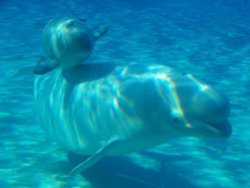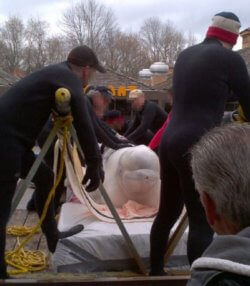In the summer of 2004, two young beluga whales, Skyla and Orion, were captured, packed into crates and loaded onto a plane in Vladivostok, Russia, where they would be bound for Toronto, Canada, 6,000 miles away.
Along with six other belugas, Skyla and Orion had been seized from their families in the Sea of Okhotsk and sold to Marineland Canada, an entertainment park in Niagara Falls. Over a period of nine years, another 24 would be captured from the Sea of Okhotsk and sold to Marineland.
Today, the 87 belugas and 10 orcas currently being held at the so-called “whale jail” on Russia’s Far East coast come from that same region. The plan for them, too, was to sell them to entertainment parks – in their case in China, where business is booming in trafficked whales and dolphins. (The Animal Welfare Institute estimates that China has at least 76 dolphinariums and marine parks, with at least 25 more planned over the next few years.)
No orca or beluga should ever have to suffer what happened to Skoot. But in the face of worldwide protests sparked by Russian animal protection groups, the Russian government is considering returning them to open ocean waters.
Marine entertainment parks are notoriously secretive about what goes on behind the scenes, and even more so in China where animal welfare laws are practically nonexistent. But what happened to Skyla and Orion offers some insight into what life is like for whales and dolphins who end up at these facilities.
Neither these two belugas, nor the six others who came with them, would ever know what it’s like to grow up with their families in the ocean. Instead, upon arrival in Toronto, they would be loaded onto trucks and driven 80 miles to their new “home” at Marineland: concrete tanks and a life to be spent entertaining tourists. Ten of them would die before reaching adulthood; others would give birth to children who, if they survived, would never see anything beyond their crowded tanks.
Like other marine entertainment parks, Marineland guards its secrets. But occasionally news leaks out, as it did in August 2012 after the untimely death of Skyla’s infant daughter, Skoot.

Skyla and her baby, Skoot. (Toronto Star)
Baby Skoot was less than a year old when, one evening, Orion cornered her in the “Arctic Cove” pool. What followed is even more distressing given that Orion and Skyla may well be brother and sister. But in the confined, totally unnatural conditions of life in a concrete tank, the social norms that beluga whales learn in the ocean growing up with their families are lost. Instead, and because the animals are in claustrophobic spaces, tension and aggression build up, just as they do among humans in close quarters. And if an older male starts to behave aggressively, infants like Skoot have nowhere to go to get out of the way.
On this occasion, Orion had teamed up with an older male, Andre, and now baby Skoot’s fate was sealed. They chased her around the pool, bit her, spun her about, and slammed her into a rock wall to which, according to a tour guide who was the only human present, she became literally stuck.

Charmin being moved at Marineland.
Skyla tried desperately to save her calf, “bashing Orion away,” as the tour guide described it, and looking up at the human as if she were pleading for help. When two trainers finally arrived and pulled Skoot from the water, the baby beluga had a series of convulsions and mini seizures and then died in their arms.
Today, Skyla and Orion are still captive at Marineland, where Skyla has had two more calves. Her heartbreaking story is by no means unique. (Check out, for example, what happened one day when Charmin and Tofino, also captured from the Sea of Okhotsk, were being moved from one display tank to another and things went awry.)
There are currently more than 55 beluga whales at Marineland, along with the lone orca Kiska, who came from Iceland. But if the Canadian Parliament passes Bill S-203: the Ending the Captivity of Whales and Dolphins Act, it will be illegal to add to their numbers. And the best future for those now in captivity there will be to retire them to seaside sanctuaries modeled on the one that the Whale Sanctuary Project is planning.
Meanwhile, for the 10 orcas and 87 beluga whales captured last year from the Sea of Okhotsk and currently languishing in sea pens in Srednyaya Bay, an even better option is taking shape. Members of our team who visited them two weeks ago at the invitation of the Russian government are confident that, given the right kind of care, all of them can be returned to the ocean. That’s because, unlike the whales at Marineland, they have not been in captivity very long.
If this is the direction that the Russian government decides to take, we at the Whale Sanctuary Project will continue to help in every way possible. After all, no orca or beluga should ever have to suffer what Skyla and Orion continue to endure on a daily basis, let alone the horror of what happened to Skoot.
It will be a long-term project requiring significant time and funding as each of the whales at Srednyaya Bay learns, at his or her own pace, the essential survival skills they will need such as how to catch their own food.
But what a day it will be when we know for sure that these orcas and belugas have the kind of future that nature intended for them.